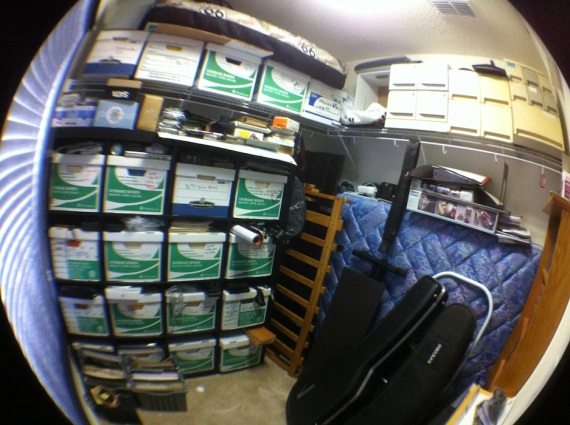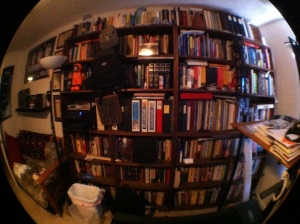
I’ve been “reading” David Sparks ibook, Paperless, and it’s really got me thinking about reducing the paper clutter in my life. Let’s just put it this way, I have a whole walk-in closet solely dedicated to dozens of boxes of papers that made it across country with me from my native California to my current life in Florida. Damn. And here I thought that I had a handle on this.
 Let’s just say that my relationship with books and paper is a long and somewhat cumbersome one. When I was getting my B.A. at Biola and later working on a Master’s degree at Fuller Seminary I couldn’t go to a bookstore without buying something. Regardless of the fact that I’ve always been a slow reader, I fell in love with books and ignored the fact it didn’t take very long before I had far more books in my library than I could ever hope to read. One of the few surviving relics of my married years are the two large bookshelves that I made from scratch. Add to this, as my college “career” stretched from one university to the next, I held on to every paper I wrote and every photocopied reference work that I used. Then during my time at Fuller in the late 1980s I decided to switch my focus from song writing to prose and that became part of my justification for hanging onto every scrap of paper that came into my life because I felt like these things might be helpful pieces of memory for when I needed something to help me write my great American novel. Thus I had quite the remarkable collection of books and papers stuffed into my studio apartment when I decided to move from Long Beach CA to Orlando FL in 2008. I don’t remember, but there were easily over 40 boxes of books and papers that I took with me across country, and that was after weeding out several boxes of “keepsakes.”
Let’s just say that my relationship with books and paper is a long and somewhat cumbersome one. When I was getting my B.A. at Biola and later working on a Master’s degree at Fuller Seminary I couldn’t go to a bookstore without buying something. Regardless of the fact that I’ve always been a slow reader, I fell in love with books and ignored the fact it didn’t take very long before I had far more books in my library than I could ever hope to read. One of the few surviving relics of my married years are the two large bookshelves that I made from scratch. Add to this, as my college “career” stretched from one university to the next, I held on to every paper I wrote and every photocopied reference work that I used. Then during my time at Fuller in the late 1980s I decided to switch my focus from song writing to prose and that became part of my justification for hanging onto every scrap of paper that came into my life because I felt like these things might be helpful pieces of memory for when I needed something to help me write my great American novel. Thus I had quite the remarkable collection of books and papers stuffed into my studio apartment when I decided to move from Long Beach CA to Orlando FL in 2008. I don’t remember, but there were easily over 40 boxes of books and papers that I took with me across country, and that was after weeding out several boxes of “keepsakes.”
I cannot tell you the last time that I bothered reading a technology book all the way through… probably never. Anyway, I’ve been listening to David Sparks and his co-host, Katie Floyd on the MacPowerUsers podcast for several weeks, so I was used to his matter-of-fact conversational style. The book, with its 36-screencast videos, was a perfect balance between explaining the “why” with simple demonstrations of the “how.” It was so effective that it was really hard to not want to put the book down about halfway through, go buy some of the products (I do hope that Sparks is getting some associates fees for promoting the Fujitsu ScanSnap) and begin digitizing the boxes and boxes of papers in my closet. And it was a different experience to stop reading and then play his screencast videos, but it was a lot more effective than wading through a text-only description of what he was demonstrating. I don’t think my girlfriend was ready for my books to start talking to me when I said that I was reading the book. But, like many things in the geek life I’ve introduced her to, she’s come to accept that sometimes our books talk back to us. And this book was one exploration into the promised paperless digital future that was well worth reading… er, listening to… viewing.
Sources:
Paperless (A MacSparky Field Guide) by David Sparks
iBooks Author from Apple
youtube video: Official iBooks Author app demo by Apple, Uploaded by srca2009 on Jan 19, 2012












